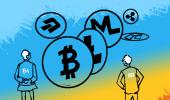Blockchain's promise: Dramatically speeding up transactions, explains Ajit Balakrishnan.
 Illustration: Dominic Xavier/Rediff.com
Illustration: Dominic Xavier/Rediff.com
The term 'blockchain' in an ordinary citizen's mind probably evokes an image of shady, masked men, whispering to each other in a dark corner of Dalal Street, hiding from the notice of law enforcement officials, plotting illicit monetary transactions to make wealth for themselves.
The real promise of blockchain technology is just the opposite: It is going to enable a world of very low-cost transactions without the expensive bureaucracy of brokers and bankers and lawyers and others adding their fees on top.
For example, a typical stock transaction can be executed within microseconds, often without human intervention. However, the settlement -- the ownership transfer of the stock -- can take as long as a week. Adopting blockchain would make it instantaneous.
It's not a coincidence that the first blockchain -- Bitcoin -- entered the public consciousness immediately following the financial crisis of 2008, when the media and public opinion reflected anger at established financial institutions and instruments.
Ten years later, wildly swinging fortunes in established financial institutions are probably what is making responsible, deep thinkers examine the promise of blockchain very seriously.
I think it's really unfortunate that Bitcoin is the first headline-grabbing product from the blockchain frame of technology ... imagine what would have happened to chemical technology if non-recyclable plastic and not pharmaceuticals and fertilisers had been the first headline-grabbing product of synthetic chemistry.
But there is another reason even experts in the field of economics and finance are disturbed by the blockchain type of thinking: A transaction is done, it is then sent to a network of peer-to-peer computers scattered across the world, the computers, using algorithms, establish the validity of the transaction, and such legitimate transactions are grouped into blocks and further transmitted.
'What,' you may exclaim; 'no experts like lawyers and bankers are used to validate each transaction? Mere okays by lay people and algorithms establish its validity and value?'
Let's pause here for a minute and examine our own belief in 'experts' versus common people's opinions. What if someone were to propose that by the same logic the Lok Sabha election of our members of Parliament, who in turn elect our prime minister, should also, in the same vein, be done only by people who have at least a college degree or some such qualification? One can expect howls of outrage.
For those of us born after Independence it is hard to imagine life without universal elections -- elections where any adult Indian citizen, whoever he may be, chooses our leaders.
In the 18th century, when voting to send representatives to the British parliament was introduced, the number of people eligible to vote in England and Wales consisted of just 214,000 people -- less than 3 per cent of the population of approximately 8 million.
And strange as it may sound today, the reason for Britain adopting the system of voting to elect members of parliament was to avoid the situation in much of continental Europe in the 19th century -- this reform was done only under the threat of revolution.
Looking back, scholars agree that the introduction of voting rights contributed greatly to Britain's political stability in the 20th century.
Since then, we have all learnt, particularly those in India since 1951, that the so-called 'common man's' views on who deserves to be elected or not is as accurate as those of experts.
Blockchain will similarly bring benefits of such de-centralisation to the country.
Part of the reason why blockchain and its related technologies are looked at with deep suspicion is the story about its origins.
On October 30, 2008, someone who first called himself Satoshi Nakamoto published a white paper, describing a digital cryptocurrency, titled Bitcoin: A Peer-to-Peer Electronic Cash System (the curious can still read it here: https://bitcoin.org/en/bitcoin-paper).
'A purely peer-to-peer version of electronic cash would allow online payments to be sent directly from one party to another without going through a financial institution,' it says at its start.
The Bitcoin network was launched on January 3, 2009, with each Bitcoin priced at $0.0008 (which now trades at $60,000 or more).
The mystery started deepening when, two years later, on April 23, 2011, Nakamoto sent a farewell e-mail to a fellow Bitcoin developer. 'I've moved on to other things,' he wrote, assuring that the future of Bitcoin was 'in good hands'. He has not been heard since, adding further to the mystery of blockchain.
A blockchain is a digital ledger that allows parties to transact without a central authority as a trusted intermediary. In this ledger, transactions are grouped together in blocks, which are cryptographically chained together in a way that is tamper-proof and creates a mathematically indisputable history.
Blockchain is not a new technology; rather, it is an innovative way of using existing technologies. The technologies underpinning blockchain are asymmetric key encryption, hash values, Merkle trees, and peer-to-peer networks.
The World Wide Web and e-mail achieved universal adoption because of a technology called TCP/IP. Before the creation of TCP/IP, electronic communication systems remained in their silos without the facility to be transmitted worldwide.
Just as TCP/IP enabled universal person-to-person messaging, Bitcoin enables bilateral financial transactions.
The development and maintenance of blockchain are open, distributed, and shared -- just like TCP/IP. A team of volunteers around the world maintains the core software for blockchain just as TCP/IP and other open-source web software is maintained.
'Smart Contracts' is the revolution that blockchain will bring, just like TCP/IP-enabled e-mail and instant messaging will permit trusted transactions and agreements to be carried out among any two parties without the need for a central authority, legal system, or external enforcement mechanism.
Imagine what that would do to our economy!
Ajit Balakrishnan (ajitb@rediffmail.com), founder and CEO, Rediff.com, is an Internet entrepreneur and as a member of the committee that updated the Indian IT Act 2008 personally wrote Section 79 which introduced the concept of 'Intermediaries' and governs Internet platforms.












 © 2025
© 2025